Jeremie Averous's Blog, page 147
August 18, 2012
The essence of entrepreneurship is about making meaning
“The essence of entrepreneurship is about making meaning“. This statement is by Guy Kawasaki, a well-known entrepreneur and venture capitalist in the Silicon Valley. According to him, the companies that really make a difference are those that aim to change the world. – and are those that also make money.
Here is a neat 2 mins video by Guy Kawasaki on this topic
(here is the link if you can’t see it above)
From my short experience as an entrepreneur, it is perfectly true that the intent to change the world is a great motivator that allows to overcome all sorts of difficult moments.
Many people think they can’t change the world. That’s wrong. We all can change a chunk of it. Smaller or larger. When do you start changing the world?

August 16, 2012
If You Choose to be Creative, You Have to Choose Not to be a Sheep
Following on our post on the “The Creativity Crisis Does Not Exist“, to be fair, creativity has a drawback though.
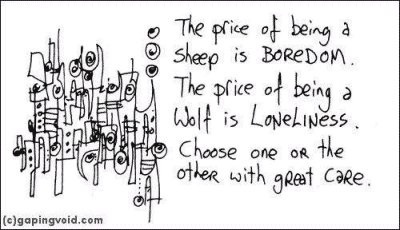
Will you be a sheep of a wolf?
And Hugh McLeod (subscribe for free to receive a daily Gapingvoid cartoon and thought) captures it fantastically as usual in this cartoon.
Yep, to be creative you need to be some kind of a lone wolf. And choose not to be sheep. Are you really ready for it? The point of Hugh McLeod is very well made – you need to choose one or the other.
At any time, in any society, only a few people are ready for being lone wolves. They will be lonely, sometimes hungry, but they will change the world.
Will you be the sheep of the wolf? Time to choose!

August 14, 2012
The Creativity Crisis Does Not Exist
Creativity has become a key concern. As measured by some standards our creativity seems to declibe. Yet globally creation has never been so buoyant. How can that be?
Following our blog post “the World Wants to Keep us Stupid“, a comment linked to this 2010 Newsweek paper “The Creativity Crisis”. Studies describe in this paper have measured that while IQ tends to increase from generation to generation, creativity tends to diminish since 1990 in the US – and in particular in younger children. When this paper came out it led to a number of reactions. The new Collaborative Age is the age of creativity! Is America losing the game? Are Western countries losing the game? Is the world losing the game?
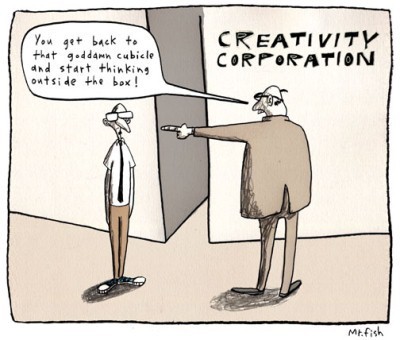
Creativity in the corporation. A model that will disappear?
There is one big logic failure here however: creativity can be learnt and taught. It can be developed quickly through the proper exercise. It can be also unlearnt in our society like shown in this fantastic example quoted from the Creativity at Work Blog:
In 1968, George Land distributed among 1,600 5-year-olds a creativity test used by NASA to select innovative engineers and scientists. He re-tested the same children at 10 years of age, and again at 15 years of age.
Test results amongst 5 year olds: 98%
Test results amongst 10 year olds: 30%
Test results amongst 15 year olds: 12%
Same test given to 280,000 adults: 2%
If you don’t understand why that happens in a conventional Industrial Age world, look at the cartoon!
So the result of tests on young children anyway does not predict their creativity as adults. It might be true that the modern kid might be enticed to do activities like video games and watching TV that do not develop as much creativity as figuring out how to play games with almost nothing – and I make sure my kids have moments where they need to be creative.
Yet the most important is also to make sure we train our creativity muscles during our entire life. And even atrophied creativity muscles can be trained back to be fit!
The Fourth Revolution shows us everyday how our collective creativity is increasing every day, both through the mating of ideas from the web, and the increasing emphasis on creativity as a key success factor. We can learn creativity. We need to practice creativity.
There is no creativity crisis. The only crisis is that the world might not be ready to welcome the wave of creativity that will change our societies beyond recognition.
Thanks to Julie Pigdon for the comment and reference that led to this post.

August 11, 2012
We should all be Chief Emotion Officers of our own life!
“A CEO of an organization should be the Chief Emotion Officer”
That’s a quote from Chip Conley, the curious leader of a very unconventional hotel chain in California. He wrote Emotional Equations , a book where he puts emotions in equations (which allow to play with the parameters): for example,
, a book where he puts emotions in equations (which allow to play with the parameters): for example,
Happiness = Wanting what you love / Having what you want,
or
Despair = Suffering – Meaning
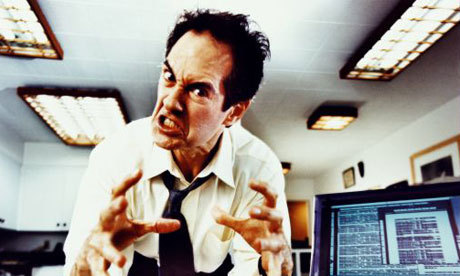
Here's your boss coming at you. How is your emotional state right now?
He just re-titled himself “Chief Emotion Officer”. In his mind, the CEO is the person that manages the organization’s general emotional status. Because it is the emotional atmosphere that defines whether people will really devote themselves to create a really exceptional organization. Because the CEO is ultimately responsible for this emotional status.
Because two-thirds of successful business leadership is about emotional intelligence.
Everyone is not a CEO, but we can also be the Chief Emotions Officer of our little world. Let’s do it, let’s increase dramatically happiness around us by modeling emotions and be more responsible about the emotions we create and spread.
When do you start?
PS: have a view of this video of Chip Conley to know more about this interesting personality and Emotional Equations

August 9, 2012
A great example of community leverage by a company: Kreg Tools
As an assiduous reader of this blog you know that in the Fourth Revolution, successful companies will leverage on their community of followers. There is a great example (and not just for wookwork lovers!): Kreg Jig community site.
The Kreg company does woodworking equipment and has an otherwise quite classical website. It is a relatively small company of a few dozen employees in a niche market.
[image error]
A Kreg community member at work
Now look at the enthusiasm of the participants to its community site, how they share videos and tips and proudly show to the world their latest woodworking project! This hugely successful community site – more than 35,000 participants apparently – must be a significant driver of sales for the company, and build a fiercely faithful tribe of followers that will spread the word. They exchange and learn together. The forums are an incredible source of information (and all comments are not necessarily positive on the company’s products).
More than that the community site is really a place to speak about woodwork, not just the products of the company! There are fancy projects, great looking results, astonishing builds..
I am not a fanatic of woodworking but now that I have looked at this community site I’m almost ready to start building one of these beautiful pieces of furniture! The power of building a community around one’s product should not be underestimated. This BBC article provides a good background information on what’s happening there and what to be careful about.
It is the power of the Fourth Revolution and it is the future of marketing. So, when do you create the community website of your product or brand?
Thanks to Heinrich Scheffer for the links – following a conversation on LinkedIn on the Fourth Revolution!

August 7, 2012
The dark little success secret of all social networks: heavy moderation
Did you know that the most successful social networks – public or private – are those that are the most moderated (or censored, depending on the point of view)? Yes, the self-organizing network is a myth.
Rare are the times where the heavy cloak that surrounds this process is lifted long enough to grab a glimpse. Meanwhile we can only listen to the recriminations of those who could not share what they wanted: a photography museum pictures here (credits for the picture below), a profile picture reproducing a famous painting there.
 Let’s face it – unfortunately, without moderation our social networks would soon be full of inappropriate pictures and would be invaded by those dark economies of vice and violence. It is not by chance that all social networks propose to flag inappropriate content; that all employ armies of moderators that censor content according to strict rules. In “The Dark Side of Facebook“, Emma Barnett exposes the global community of low paid Facebook moderators, and how they have to deal on a daily basis with crass content.
Let’s face it – unfortunately, without moderation our social networks would soon be full of inappropriate pictures and would be invaded by those dark economies of vice and violence. It is not by chance that all social networks propose to flag inappropriate content; that all employ armies of moderators that censor content according to strict rules. In “The Dark Side of Facebook“, Emma Barnett exposes the global community of low paid Facebook moderators, and how they have to deal on a daily basis with crass content.
And it is not just Facebook: for example Wikipedia also employs many moderators who react almost instantly on inappropriate content. Even if the content “does not follow editorial quality rules”. Ever had the experience of having your contribution rejected from Wikipedia because ‘they’ decided it was not important enough, or maybe even not accurate? I did, many times.
Think about it: Paypal has been very successful not because of its operation mode – which is OK – but because from the beginning it has integrated defenses against fraud, maintaining the fraud level low enough to remain economical. Early competitors did fail under the burden of excessive fraud. From time to time that’s a hassle when you want to pay a friend in a less safe country; but overall it is what has allowed Paypal to remain afloat.
This is a lesson for all those that believe that setting up a social network is just setting it up technically and letting people self-organize, driven by the good in them: always make sure that an adequate supervision and moderation is maintained and even censor a bit too much just to make sure that the system remains acceptable for the majority of people. Moderation can be lighter if the community is regulated otherwise (like inside an organization for example) or heavier if the community is totally open.
Too bad for those that naively believe that social networks is paving the way for free speech, free expression. You can express yourself – if that follows the rules and the will of the social network managers. And it is not possible to avoid it – moderation is mandatory to maintain the health of the social network and its acceptability, on the long term.
Ownerwhip of the network is indeed important and strategic when it comes to political and social expression. Will we see society rebel against those social network moderators like it did against too strong press magnates? How can we make sure that this moderation remains ethical and not politically biaised? Regulation here is more important than protecting Hollywood rights – it is the future of democracy at world level that is at stake.

August 4, 2012
Do you know “Vuja Dé”? – a word that can change the world
I was reading the book Practically Radical: Not-So-Crazy Ways to Transform Your Company, Shake Up Your Industry, and Challenge Yourself
by William C. Taylor. The concept of the book is that crisis moments are the best moments to redefine businesses and economic models. More about it in a future post.
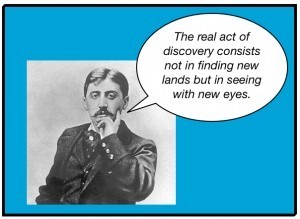
Vuja De, an old and useful concept!
One of the key concepts explained in the book caught my eye and ignited my attention. The concept is simply Vuja Dé. The reverse of “Déja Vu” obviously, French for “seen already”. This concept implies the possibility to look at the same old things and redefine how we use them.
Or, like Proust, a famous French author of the beginning of the XXth century says in the quote, seeing the same thing with new eyes.
How can we redefine what seems to be an established practice, business, industry through the use of Vuja Dé? Not just improve, but redefine?
This is a word that has the power to change the world, because it names a concept which is truly useful in these times of change. A concept of rupture, of reinvention.
Ready to Vuja Dé your job? Your business? Your industry? Tell me how this word changes your mindset in the comments!

August 2, 2012
Crowdsourcing to take control of health and emergency response
In the Netherlands, AED mapping has been crowdsourced so as to save patients that might need them urgently. A project is called to do that on a worldwide basis. Watch this TED video
The crowd is taking emergency intervention in their hands.
The other side of the video about taking your blood pressure, hopping on the scale… and there goes your latest health parameter on the web… to your doctor, to your social network. Are you ready to go that far?

July 31, 2012
The Hospital – another Institution that will not survive the Fourth Revolution without a deep transformation
The modern hospital is a Health Factory, and Institution of the Industrial Age. We seek there maximum effect of scale for producing a product called “health”. It is centralized, and even more so that the increasing complexity of modern healthcare, coupled with easier transportation, leads to a concentration of facilities and the disappearance of smaller, more local healthcare centers.

The hospital, the health factory, will be replaced by new institutions
Hospitals are there to solve situations where the sickness or the trauma is already declared. Without asking its opinion to the patient, because doctors have the knowledge of what needs to be done, it brings people into a system designed to be as efficient as possible in healing them. Tools designed by science – efficient medicines- are used.
How will healthcare transform through the Fourth Revolution? Like in other institutions of the Industrial Age, many of its foundations will be shaken and buckle:
through internet, patients know a lot about their conditions and doctors cannot handle patients like they did before – today they need to open a conversation with the patient, listen and convince
the ability to record data on iPads and all sorts of modern communicating devices makes home monitoring much easier than before
the same apps on ubiquitous devices can play an increasing role in prevention and monitoring, thus preventing cases to become so severe that hospitalization is unavoidable.
soft medicines, traditional medicines and other aspects of everyday life like one’s diet are recognized as increasingly important and powerful in preserving health; and they do not happen in hospitals
Where the Industrial Age concentrated health production in a factory called an hospital, the Fourth Revolution will again decentralize the production of health in the palm of everyone’s hand.
The medical world is one of the most conservative. Will they realize that this wave of change is coming to them before the hospital institution succumbs to the crushing forces of the Fourth Revolution?

July 28, 2012
How having ‘skin in the game’ is necessary to grow and do incredible stuff
As I am struggling with some aspects of my new entrepreneur life, I was reading “Uncertainty: turning fear and doubt into brillance” by Jonathan Fields, an excellent book about what it takes to lean out of one’s comfort zone, and how to survive it. A quote struck me particularly:
“Risk of loss has to be there. You cannot create genius without having skin in the game. Kill the risk of loss and you destroy meaning and one of the core motivations for action” – Jonathan Fields
Right now I am facing activities which I must absolutely do for my new business to live further but that I don’t like doing: networking, meeting people to pitch products. I rather prefer to write clever reference documents and books in front of my computer! Still, that’s what I seek to learn; and because I now have skin in the game (the success of my venture, my family’s comfort, my money), I’ll force myself to do it. And I’ll do it for sure. That’s quite compelling in fact: if I don’t do it, no new business, no more adventure!
Because I have skin in the game, I’ll go up the steep learning curve and lean outside my comfort zone much deeper – another justification why creating one’s company is much more powerful than doing and MBA or an expensive education program.
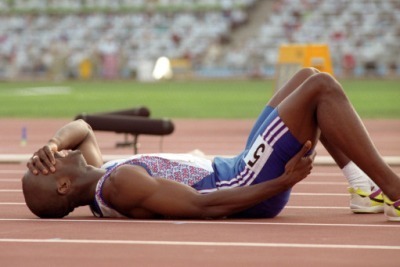
Having skin in the game... and what sometimes happens
Because I have skin in the game I’ll also probably get hurt some place down the way – or at least get some hard knocks. But that’s probably what’s going to teach me resilience and patience, two other important learning points for me.
Yes, definitely I have chose to have skin in the game. That’s tough, but three months down the road I am already amazed at the way I’m gone. That’s probably the only way to really do things that you didn’t think you could do. The only way to create amazing things that will astonish the world.
And you, did you put your skin in the game? How could you do that?




